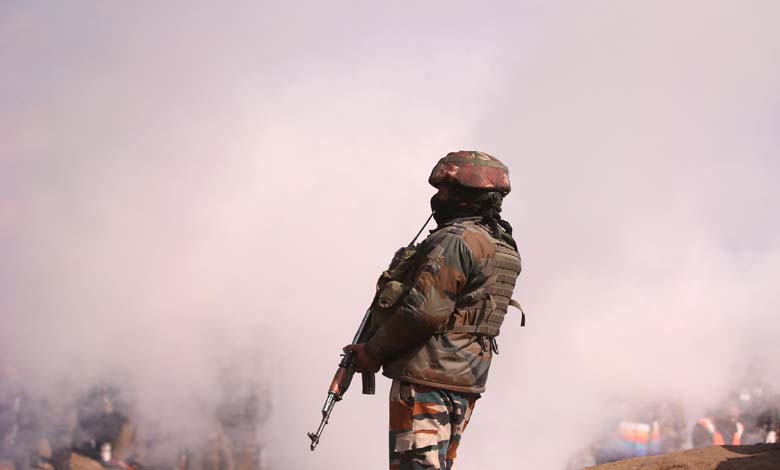Dozens Killed in Indian Airstrikes on Pakistan Amid Fears of All-Out War

Islamabad calls New Delhi’s attack a “blatant act of war” and informés the UN Security Council it reserves the right to respond appropriately to Indian aggression.
India launched an attack on Wednesday against Pakistan and the Islamabad-controlled part of Kashmir, killing 26 people and injuring about 50, while Pakistan claimed to have shot down five Indian fighter jets—marking the worst confrontation between the two rivals in over two decades.
-
Indian Army vs. Pakistani Army: Comprehensive Comparison of Military Power Between the Two Nuclear Neighbors
-
Will a Nuclear War Break Out with India? Pakistan’s Defense Minister Gives a Decisive Answer
India stated it had targeted nine Pakistani “terrorist infrastructure” sites, some linked to a recent Islamist attack on Hindu tourists in Indian Kashmir that left 26 people dead. Islamabad said six Pakistani sites were struck, resulting in the death of eight civilians.
An Indian defense source told Reuters that the strikes targeted the headquarters of Jaish-e-Mohammed and Lashkar-e-Taiba, two militant Islamist groups. The Indian Ministry of Defense added in a statement: “India exercised great restraint in selecting targets and the method of execution.”
-
Rescue of Members of the Qatari Royal Family from a Bombing in Pakistan
-
New Terrorist Attack in Pakistan: Casualties and Injuries
Pakistan confirmed that three sites were hit by missiles, and a military spokesperson said five Indian jets were downed. Military spokesperson Ahmad Sharif Chaudhry stated: “All these engagements were defensive in nature. Pakistan remains a highly responsible state. However, we will take all necessary steps to defend the dignity, integrity, and sovereignty of our nation—whatever the cost.”
Four local government sources told Reuters that three Indian fighter jets crashed in Jammu and Kashmir on Wednesday.
Islamabad labeled New Delhi’s attack a “blatant act of war” and informed the UN Security Council of its right to respond appropriately to Indian aggression.
-
Judicial Escalation: Imran Khan’s Party Faces Potential Ban in Pakistan
-
Tehran refuses cooperation… Pakistan accuses Iran of harboring terrorist groups
Witnesses and police reported heavy artillery and gunfire exchanges between the two armies along much of the de facto border in the disputed Himalayan region of Kashmir.
India and Pakistan have fought two wars since 1947 over Kashmir, a majority-Muslim region both countries claim in full but control in part.
Since a 2003 ceasefire, reaffirmed in 2021, direct strikes have been rare, especially Indian strikes on Pakistani territory outside of Kashmir.
Analysts now warn the risk of escalation is higher than in recent years due to the severity of the Indian offensive, which New Delhi has dubbed “Operation Sindoor.”
-
Peshawar mosque bombing reveals insurgency within Pakistani Taliban
-
Pakistan’s first victim: Taliban terrorism in Afghanistan poses the greatest threat to neighboring countries
U.S. President Donald Trump called the situation “shameful” and expressed hope for a swift resolution. A spokesperson for UN Secretary-General Antonio Guterres urged both sides to exercise maximum military restraint.
The Indian army reported that Pakistani shelling across the border in Kashmir killed three civilians. Indian TV channels aired footage of explosions, fire, and thick smoke rising into the night sky, as civilians fled in parts of Pakistan and Pakistani-administered Kashmir.
Pakistani Prime Minister Shehbaz Sharif said Islamabad was responding to India’s attacks, without giving specifics. The chief minister of Punjab province declared a state of emergency, stating that hospitals and emergency services were on high alert.
-
Assassination of Pakistani Taliban leader threatens stability
-
Pakistan ‘’charts’’ Taliban road map for international recognition
A military spokesperson told Geo TV that two mosques were among the Indian strike targets.
Defense Minister Khawaja Muhammad Asif told Geo TV that all the sites targeted by India were civilian, not militant camps, calling India’s claim of hitting “terrorist camps” false.
Following the airstrikes, the Indian army posted on X (formerly Twitter): “Justice has been served.”
An Indian embassy spokesperson in Washington claimed evidence clearly pointed to terrorists based in Pakistan being involved in the tourist killings in April. India said two of the three suspects were Pakistani, though it did not detail the evidence.
-
Pakistani Police: 3 Afghans from ISIS Group Killed Near Border
-
Pakistani woman sentenced to death for “blasphemy”
Pakistan denied any involvement in the tourist attack.
Several airlines, including IndiGo (India’s largest carrier), Air India, and Qatar Airways, canceled flights in the region due to airport closures and restricted airspace.
An Indian source said National Security Advisor Ajit Doval spoke with U.S. Secretary of State Marco Rubio, and senior Indian officials briefed counterparts in the UK, Russia, Saudi Arabia, and the UAE on developments.
These strikes far exceed New Delhi’s previous responses to attacks in Kashmir, such as the 2019 air raid after 40 Indian paramilitary officers were killed, and the 2016 response to the death of 18 soldiers.












